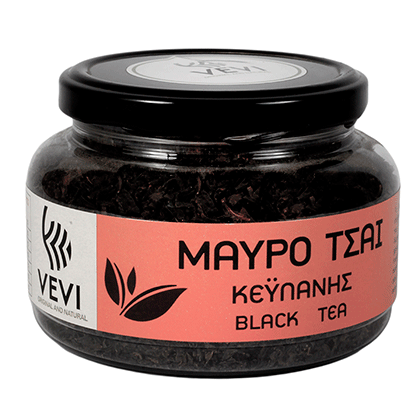
The many antioxidants and polyphenols in black tea are associated with a number of health benefits. Specifically, black tea contains complex flavonoids, which are polyphenols that aid in disease prevention. A single cup of black tea contains an average of 200 mg of flavonoids. (Many doctors now recommend getting 600 mg of flavonoids per day for a range of health benefits.) The flavonoid polyphenols in black tea known as thearubigin and theaflavin act as especially powerful antioxidants.
Interestingly, these two flavonoids are more concentrated in black tea than in green tea.
Nutritional Value of Black Tea
Like other types of tea, black tea contains:
-
Caffeine
-
Amino acids
-
Carbohydrates
-
Proteins
-
Potassium
-
Major minerals and trace minerals
-
Manganese
-
Fluoride
-
Polyphenols
Black tea also contains catechins (the powerful antioxidants in tea that fight cancer-causing cells and help prevent heart disease), tannins (the naturally occurring chemical compounds that give black tea and red wine their astringency), guanine (a natural stimulant) and xanthine (another natural stimulant, similar to caffeine).
Additionally, black tea is low in sodium and calories , thus, black tea has a bold flavor, making it a good substitute for those accustomed to soft drinks other unhealthy beverages (which also tend to have bold flavors).
Black Tea and Cardiovascular Health
As I mentioned, black tea is abundant in antioxidants, such as flavonoids. These antioxidants have been demonstrated to lower the risk of heart disease. They do this by preventing the oxidation of LDL cholesterol and preventing damage in both the bloodstream and at artery walls. Additionally, black tea flavonoids are able to both improve coronary vasodilation and reduce clots, and its manganese may reduce the risk of coronary heart disease by helping cardiac muscle function.
Studies have shown that as few as three cups of tea per day can improve heart health.
Cancer Prevention
Perhaps the most-studied tea health benefit is its anti-cancer benefit. While most of the study has been on green tea, there is a growing body of evidence that black tea also plays a role in cancer prevention.
It appears that the polyphenols in tea help prevent the formation of potential carcinogens in the body.
This is particularly true with certain types of cancer, such as ovarian cancer, lung cancer, prostate cancer, colorectal cancer and bladder cancer. Some studies also show that black tea may help prevent stomach cancer, prostate cancer, breast cancer and oral cancers (especially for those who use tobacco products).
The mechanism with which black tea prevents cancer is an interesting one. Black tea contains a compound called TF-2. This chemical causes apoptosis ("programmed death") of cancer cells without harming normal, healthy cells. This helps to stop cancer growth before it even becomes noticeable, and may help in cases where cancer has already been diagnosed. Additionally, black tea also prevents cancer by inhibiting the formation and growth of malignant tumors.
How Black Tea Benefits the Immune System
The tannins in black tea don't just give it its characteristic taste.
Several studies have shown that tannins help fight viruses such as influenza ("the flu"), dysentery and hepatitis. Black tea also contains alkylamine antigens, which help boost immune response.
Black Tea and Oral Health
There are many old wives' tales about tea freshening the breath and cleansing the mouth. It turns out that they're true! Research has found that black tea may reduce oral cancers. Additionally, tea's polyphenols and tannins kill and prevent the bacteria that cause tooth decay, and to drastically reduce the oral bacteria that cause bad breath. So drink some black tea and say, "Ahhh!" without worry!
Black Tea's Digestive Benefits
The tannins in tea in general (and black tea in particular--it has more of them than other tea types) offer digestive benefits. They soothe gastric and intestinal illnesses, generally aid in digestion and decrease intestinal activity (making them useful for those suffering from diarrhea).
Black Tea and Skin Health
Drinking black tea benefits the skin in three ways. First, it nourishes the skin with vitamins B2, C and E, with minerals such as magnesium, potassium and zinc, and with essential polyphenols and tannins. Second, its caffeine and some of its other chemical components can kill oral viruses, which helps prevent skin infections (and pimples!). Third, black tea has been shown to reduce "mimic wrinkles" and signs of premature aging.
Black tea can also benefit your skin with direct contact/application. For example, placing black tea bags under your eyes helps reduce puffiness and dark circles. And using black tea for herbal baths can provide an antioxidant boost for your skin and may even provide low levels of sun protection.
Black Tea and Hair Health
Although it may seem rather vain compared to some of the other more life-altering health benefits of black tea, black tea is fantastic for your hair!
The high levels of antioxidants and caffeine in black tea both benefit hair health. The caffeine decreases a hormone that causes hair loss (known as DHT or Dihydrotestosterone), while the antioxidants promote healthy hair growth.
However, excess caffeine may stunt hair growth, so be careful not to overdo it!
Black tea can also add shine, luster and darkness your hair if you incorporate it into your hair care regimen. For more information on how to use black tea in your hair care regimen, see this video on natural hair care.
The Bone and Connective Tissue Benefits of Black Tea
If you drink tea regularly, you are more likely to have stronger bones and connective tissue than someone who doesn't drink tea regularly. Scientists believe this may be due to tea's phytochemicals.
This Is Your Brain (and Nervous System) on Black Tea
The caffeine in black tea has been shown to improve mental focus and concentration by promoting blood flow in the brain. Unlike drinks with higher levels of caffeine and other stimulants (i.e., coffee and energy drinks), the caffeine in black tea is less likely to over-stimulate the heart and cause other unpleasant side effects.
Caffeine aside, studies show that L-theanine (an amino acid found in black tea) balances the effects of caffeine in a unique way, helping you concentrate more fully on tasks and act in a focused but relaxed manner.
Furthermore, studies show that one month of four cups of black tea a day reduces levels of the stress hormone cortisol enough to boost your memory function, and some studies suggest that regular black tea consumption may prevent Parkinson's disease.
Black Tea Increases Your Energy Level
I know this sounds like a no-brainer; however, the way in which black tea increases your energy level is worth noting.
Moderate caffeine consumption not only stimulates metabolism, it also increases alertness and overall brain function. The caffeine in tea is mitigated by the naturally occurring chemical L-theophylline, which makes the effects of tea on energy level more smooth and continuous than the sometimes jarring effects of coffee and caffeinated sodas. Additionally, while caffeine mainly stimulates the muscles, L-theophylline targets the heart, kidneys and respiratory system, so the overall impact on the body is more evenly distributed and balanced.
The Benefits of Black Tea's Thearubigins
Compared to other tea types, black tea is particularly high in chemical compounds called thearubigins. These chemicals give black tea its reddish color and are formed during the oxidation process of making black tea. Studies suggest that thearubigins benefit the body and mind in many ways, including lessening the effects of coughs and colds, providing anti-inflammatory effects that benefit certain illnesses such as IBS, and fighting prostate cancer and A375 melanoma cells.

